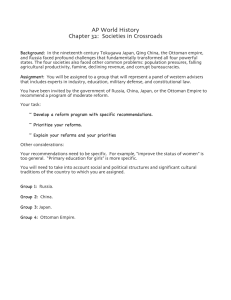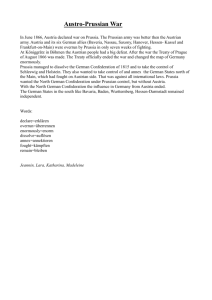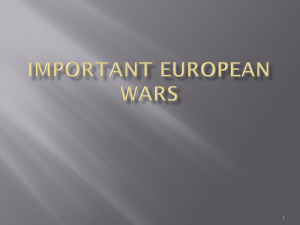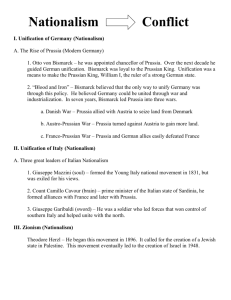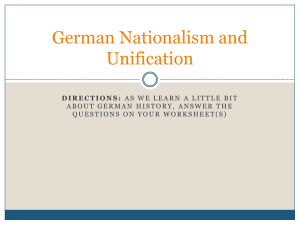European Wars - Northwest Regional ESD
advertisement
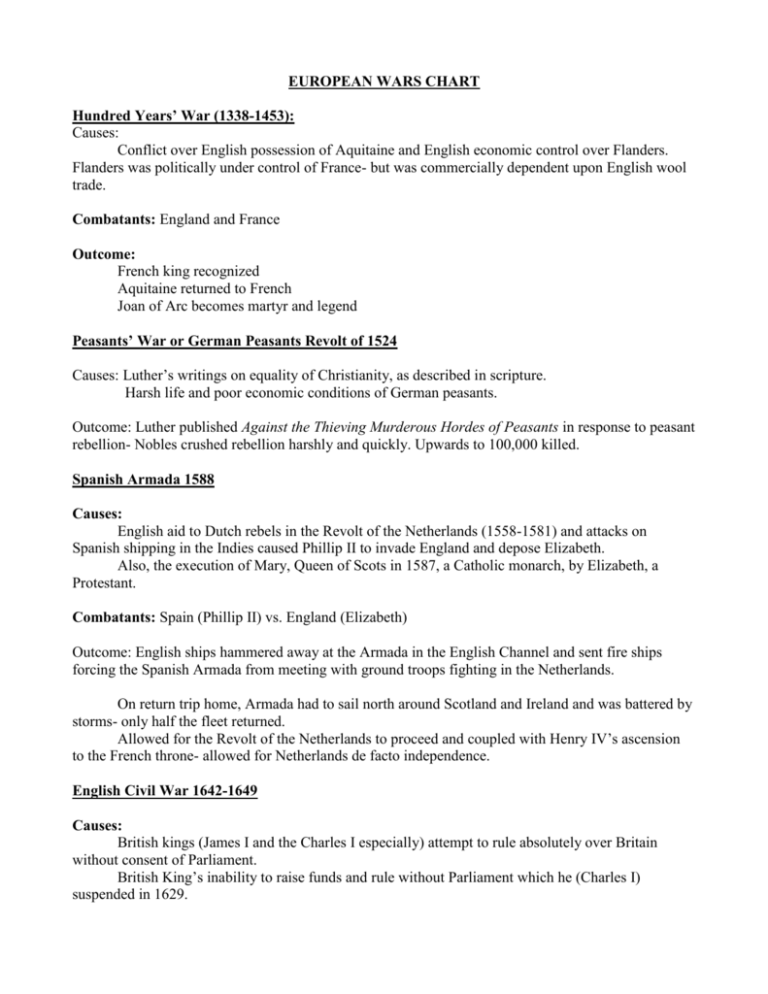
EUROPEAN WARS CHART Hundred Years’ War (1338-1453): Causes: Conflict over English possession of Aquitaine and English economic control over Flanders. Flanders was politically under control of France- but was commercially dependent upon English wool trade. Combatants: England and France Outcome: French king recognized Aquitaine returned to French Joan of Arc becomes martyr and legend Peasants’ War or German Peasants Revolt of 1524 Causes: Luther’s writings on equality of Christianity, as described in scripture. Harsh life and poor economic conditions of German peasants. Outcome: Luther published Against the Thieving Murderous Hordes of Peasants in response to peasant rebellion- Nobles crushed rebellion harshly and quickly. Upwards to 100,000 killed. Spanish Armada 1588 Causes: English aid to Dutch rebels in the Revolt of the Netherlands (1558-1581) and attacks on Spanish shipping in the Indies caused Phillip II to invade England and depose Elizabeth. Also, the execution of Mary, Queen of Scots in 1587, a Catholic monarch, by Elizabeth, a Protestant. Combatants: Spain (Phillip II) vs. England (Elizabeth) Outcome: English ships hammered away at the Armada in the English Channel and sent fire ships forcing the Spanish Armada from meeting with ground troops fighting in the Netherlands. On return trip home, Armada had to sail north around Scotland and Ireland and was battered by storms- only half the fleet returned. Allowed for the Revolt of the Netherlands to proceed and coupled with Henry IV’s ascension to the French throne- allowed for Netherlands de facto independence. English Civil War 1642-1649 Causes: British kings (James I and the Charles I especially) attempt to rule absolutely over Britain without consent of Parliament. British King’s inability to raise funds and rule without Parliament which he (Charles I) suspended in 1629. Combatants: Roundheads (supporters of the Parliament, Puritans) vs. Cavaliers (King Charles I and his supporters) Outcome: Roundheads led by Oliver Cromwell defeated Cavaliers. King Charles I was captured, imprisoned and then executed. English monarchy was ended temporarily (1649-1660) Oliver Cromwell first set up a republic which later became a military dictatorship when Parliament got in his way, which later made they English want to return to a parliamentary monarchy and invite Charles II back. Long term effect- eventually led to the Glorious Revolution of 1688, which eventually weakened the monarchy and raised the power of the Parliament even more. Thirty Years’ War (1618-1648) Causes: Old hatreds between Catholics and Lutherans. Peace of Augsburg concluded that cuius region, eius religio (whose region, his religion)- led to changes in rulers and religions, etc… -Issue of Calvinism not addressed in Peace of Augsburg and the religion had greatly spread throughout Germany -Ferdinand of Styria became new monarch of Bohemia- He was Catholic. When he sent two advisors to the area, the protestant Czech nobles threw the Catholics out the window, called the “defenestration of Prague”. Combatants: Bohemian Phase: Protestant Union in Bohemia vs. Ferdinand and Spain, Catholic League. Danish Phase: Christian IV of Denmark intervened on behalf of Protestants, backed by English and Dutch Netherlands. Swedish Phase: Sweden enters to aid Protestants (Gustavus Adolphus) French Phase: France and Cardinal Richelieu intervened to destroy Austrian and Spanish Habsurg power, so they joined the side of Sweden, Dutch, Savoy and numerous German princes. Outcome: Peace of Westphalia, 1648 Gave France important territories on German frontier and increased French power Gave France influence in German states- which it would use to keep divided for 200 years Made German princes and states practically independent of the Holy Roman Empire Calvinists were admitted to the religious privileges of the Peace of Augsburg Spain officially recognized the United Provinces. War of Spanish Succession (1701-1714) Causes: 1700, last Spanish Habsburg ruler, Charles II, died without heirs- Louis claimed the throne for his grandson, Philip of Anjou. Threat of Bourbon control of both France and Spain, drew together countries into a “Grand Alliance” against Louis XIV, who supported the claim of the throne by an Austrian Habsburg. Combatants: Louis XIV and France vs. Grand Alliance (England, Holy Roman Empire, the Dutch, Brandenburg-Prussia) Outcome: Austrian Habsburg candidate unexpectedly rose to the throne of Austria, and caused the Grand Alliance to worry about the joining of Austrian and Spanish crowns. Compromise settlement made at Peace of Utrecht (1713-1714) -Philip of Anjou (grandson of Louis XIV became King Philip V of Spain, on condition that French and Spanish crowns would never be united. -Austrian Habsburgs received the Spanish Netherlands, Milan, Naples, Sardinia. -the elector of Brandenburg received the title of “king in Prussia” -England received Newfoundland, Nova Scotia, Hudson Bay from France -England received Gibraltar, Minorca, and the monopoly of the American slave trade from Spain. The War of Polish Succession (1733-1735) Causes: 1733, France intervened in the election of a successor to Augustus II as king of Poland, backing Louis XV’s father-in-law, Stanislaus Leszczynski, a protégé to Swedish King Charles XII. Augustus II’s son was backed by Austria and Russia. Combatants: France vs. Russia and Austria in Poland France, Spain, Savoy (or Sardinia) vs. Austria Outcome: France overwhelmed in Poland by Russia. Treaty of Vienna (1735-1738): -Spain recovered Naples and Sicily from Austria -Augustus III placed on the throne. The War of Austrian Succession (1740-1748) Causes: Austrian emperor Charles VI passed Pragmatic Sanction, guaranteeing the succession of his daughter Maria Theresa. Frederick the Great (II) of Prussia immediately seized Silesia upon his death in 1740. Other European powers came to either side’s aid, based largely on a trading war in the Americas and the Atlantic called the War of Jenkins’ Ear- between the Spanish and English. Combatants: Prussia, France, Spain, Saxony, Bavaria versus Austria and British (who were battling France and Spain in the trade war) Outcome: Balanced alliances- not much changed except Frederick II kept Silesia and increased the size and power of Prussia. Prussia’s size and power alarmed others and France and Austria surprised everyone by signing an alliance. This was known as the “Diplomatic Revolution of 1756.” Prussia became ally of Britain. Everyone agreed this was more of a truce than an ending of the war- led to Seven Years’ War. Seven Years’ War (1756-1763) Causes: Anglo-French had begun French-Indian War in American colonies in 1754 over disputed lands in Ohio Valley. Reversed alliances from the War of Austrian Succession (GB, Prussia vs. French, Austria, Sweden, Russia) Outcomes: Treaty of Paris of 1763: British won most of France’s colonial empire- Canada and India Prussia repeatedly defeated three enemies whose combined population was 12 times bigger. British won Ohio Valley and eastern half of Mississippi River Valley Napoleonic Wars (1803-1815) Causes: Leftover problems from earlier attempts to intervene in French Revolution Napoleon’s ambition British suspicions of Napoleon’s desires and fear of growing influences and interventions in Dutch Republic, Italy, Switzerland, German states British gave Napoleon an ultimatum- which he ignored. Combatants: French vs. Third Coalition (Great Britain, Russia, Austria and eventually Prussia) Outcomes: -Napoleon’s victories in Germany led to the Confederation of the Rhine- which officially dissolved the Holy Roman Empire. -Spread of nationalism wherever Napoleon went as a result of his establishment of puppet kings. This led to the beginnings of strong nationalism throughout Europe, especially Germany. -Spread of liberalism- ideas of the French Revolution as the Napoleonic Code was installed and class distinction was abolished. Abolished serfdom and made church subordinate to state. Congress of Vienna (1814-1815) -restoration of Bourbon monarchy -agreement that no single state should be allowed to dominate Europe. -establishment of buffer states to act as barriers to French expansion- Kingdom of Netherlands (including Belgium), Genoa and Piedmont in the south. -Prussia was was given more territory along border of France -Holy Roman Empire was not revived -promised to quash liberal revolutions that threatened legitimate monarchs -Napoleon sent to Elba Hundred Days: Napoleon’s escape and return- defeated at Waterloo- exiled to Saint Helena off the coast of Africa where he died in 1821. Crimean War (1854-1856) Causes: Long standing rivalry between Russia and Ottoman Empire. Ottoman Empire had given Catholic France rather Orthodox Russia oversight of the Christian shrines in the Holy Land. Russia wanted to extend its control over the Ottoman provinces of Moldavia and Walachia (present day Romania) which it occupied in the summer of 1853. Ottoman’s declared war in summer of 1853. Combatants: France and Great Britain joined Turks, as they were opposed to Russian expansion in the eastern Mediterranean- threat to their own interests. France, Great Britain, Turks vs. Russia. Outcomes: Treaty of Paris of 1856: -unfavorable to Russia. Russia had to surrender territory, recognized neutrality of Black Sea, and renounce claims of protection over Christians and Christian shrines in Ottoman Empire. -Russia’s image (which surged during the Napoleonic Wars) was shattered. -first failure of the Congress of Vienna (also known as the Concert of Europe) Seven Week War/Austro-Prussian War (1866) Causes: Tension over the rule over Schleswig and Holstein, recently won in the Danish War by Prussia. Bismarck’s desire to defeat Austria and remove them as an influence on German states Combatants: Austria vs. Prussia. Bismarck had worked out a deal with Napoleon III to remain neutral. Bismarck also gained the support of Italy who wanted Venetia. Outcome: Treaty of Prague- was quite lenient on Austria. They lost no territory except Venetia. Austria would be permanently excluded from German affairs, leaving Prussia as the only major power among the German states Led to the unification of the northern German states and allowed a future alliance between Austria and Prussia during the Franco-Prussian War. Franco-Prussian War (1870-1871) Causes: Bismarck’s desire to bring southern German states into the North German Confederation. Bismarck’s manipulating and inflaming a succession situation in Spain where a Hohenzollern (cousin of William I) France fearful of having Prussia’s influence in Spain. Bismarck’s manipulation of a telegram making it appear William I insulted France- who then declared on PrussiaCombatants: France vs. Prussia Outcome: -Napoleon III captured, abdicates. -German Empire declared in Hall of Mirrors -southern German states joined northern states -Germany received territories Alsace and Lorraine -Long-term effects: Strong conservative state formed Resentment of French French returned to a republican government “third republic” Austrians weakened to point where they established a “dual monarchy” with Hungary Russo-Turkish Wars (1875-1878) Cause Uprising in Ottoman Balkan provinces of Bosnia and Herzegovina. Weakness of Ottoman Empire, encouraged Serbia to come to aid of Slavs. Russia came to aid to protect Slavs and expand Russian territory at expense of Turks. Combatants Serbia, Bulgaria, Russians, Bosnians versus Ottoman Turks Outcome: Treaty of San Stefano: -Slavic states freed from Ottoman control -Russia gained Ottoman territory Many in Europe alarmed about balance of power and nationalist movements in Balkans. Led to the Congress of Berlin- where treaty would be reviewed by Great Powers Boer War (1899-1902) Causes Conflict over land claims between British imperialists and Dutch Boer farmers in Transvaal in South Africa, desired because of recently found gold. Combatants British vs. Dutch Boers Outcome: British victorious World opinion of British suffered British later allowed Transvaal and Orange Free State to be fully self-governing. Later two states joined other south British colonies to form the Union of South Africa. Russo-Japanese War (1904-1905) Causes: Rivalry between Russia and Japan over influences in Korea and Manchuria Japan attacks Russian Naval base established in Manchuria. Combatants: Russia and Japan Outcome: Russians humiliated. Japanese gain lands/ports in Manchuria and influence in Korea. Japanese stun the world and become one of great powers of world. World War I (1914-1918) Causes: Nationalism, competition over imperial lands, increased militarization, Systems of Alliances Sparking event: assassination of archduke Franz Ferdinand and Austria-Hungary’s ultimatum (which they had a blank check of support from Germany). Combatants: Central Powers: Germany, Austria-Hungary, Ottoman Empire, Bulgaria Allied Powers: Great Britain, France, U.S., Russia, Serbia Outcome: Treaty of Versailles: unfair treatment of Germany caused resentment -ineffective League of Nations without U.S. involvement -war guilt clause forced Germany to take complete blame -huge war reparations forced on Germany- led to failure of Weimar Republic -Germany and Russia lost land -nine new nations created Unresolved issues and depression led to rise of totalitarian and fascist dictators. Italian-Ethiopian War (1934-1936) Causes: Italian desires fro making Mediterranean Sea an “Italian lake” (expansion) Mussolini’s desire to build nationalism Take attention away from economic problems Revenge for earlier Ethiopian defeat of Italy Combatants: Italy vs. Ethiopia Outcome: Italy defeats Ethiopia in an early act of aggression that is unchecked by European powers. Europe appeased aggression to avoid conflict-showed the League of Nations was useless. Ethiopia annexed by Italy. Spanish Civil War (1936-1939) Causes: Fascists and ultra-nationalists appealed to poor peasants who had been promised land reform from socialist Popular Front government in Spain, which did not occur fast enough. Fascists began to take land from government. Combatants: Fascists/ultra nationalists led by Ferdinand Franco vs. socialists/communists Popular Front. Germans and Italians assist fascists (especially at Guernica). Stalin supports socialists. Outcome: Fascists/ultra nationalists led by Franco takeover in 1939 and leads Spain until 1975. World War II: Causes: Unresolved problems of WWI. Worldwide depression allowing for the rise of dictators Appeasement policies of aggressor nations. Ineffective League of Nations. Combatants: Allied Powers: Soviet Union, U.S., Great Britain. France, China Axis Powers: Germany, Italy, Japan Outcome: Allied victory with unconditional surrender of Germany. Atomic age begins. Germany divided into East and West zones. Iron Curtain falls across Europe- West becomes democratic- East becomes communist satellites of the Soviet Union. Cold War Begins United Nations formed. Soviet Invasion of Afghanistan (1979-1988) Causes: Soviet Union wanted to establish a pro-Soviet regime in Afghanistan Combatants: Soviet Union, Afghanistan (U.S. indirectly involved- viewed it as expansionist act and boycotted the 1980 Moscow Olympics and put an embargo on grain to Soviets) Outcome: Soviet Union controlled Afghanistan. Afghanistan resisted and rebelled throughout 1980s. Soviet Union eventually withdrew in 1988. 90,000 Afghans killed. 22,000 Russians killed Cold War intensified. Falkland Islands (1982) Causes: Argentina, to take pressure off economy and ruled by a military regime, invade the Falkland Islands (off the coast of Argentina) which had been controlled by the United Kingdom for hundreds of years. Combatants: Argentina vs. United Kingdom (Great Britain) Outcome: Great Britain sent ships and troops and retook the islands. The loss discredited the military regime in Argentina and led to an elective government in Argentina. Falkland Islands still owned by United Kingdome

